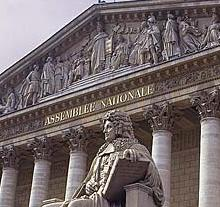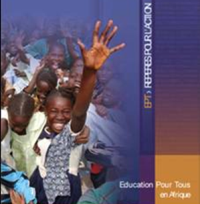Government Donors
France

- © UNESCO
- L'assemblée Nationale Paris
In 2007 extrabudgetary contributions from France amounted to US$ 5.142.101 placing this country in the tenth position among UNESCO’s extrabudgetary bilateral donors. The French Government has fixed an objective to attain an ODA ratio of 0,7% of GNI in 2012.
Since 1999, the Ministry of Cooperation and Development was integrated into the Ministry of Foreign Affairs, creating a Directorate for International Cooperation and Development (DGCID) as well as an Inter-ministerial Committee for International Cooperation and Development, established to ensure overall coordination of activities.
In 2004 following further restructuring certain activities which were under the responsibility of the Ministry of Foreign Affairs were transferred to the Agence française de développement (AFD). This reform in 2004 reinforced the Agence française de développement (AFD) as pivotal operator for implementation of projects in the Priority Solidarity Zone (PSZ, see below)). Therefore, to assume only areas of interest to UNESCO, the AFD executes bilateral French projects concerning basic education, the environment and professional training. The Ministry of Foreign Affairs still manages strategic planning and supervises the overall policy of French development aid. It remains the major coordinator of all public interventions in the field of cooperation, and maintains direct supervision with regard to cultural and scientific cooperation, training in higher education, cooperation with non governmental organizations and the promotion of human rights. With regard to countries which are not within the PSZ, all cooperation activities remain under the authority of the Ministry of Foreign Affairs. This Ministry also supervises multilateral activities in sectors where responsibility has been transferred to the AFD. It is within this role that the MoFA has created a fund for the follow-up of the World Forum for Education for All at UNESCO even though on a bilateral level, French projects in basic education are now implemented by the AFD.
Geographical priorities, principal themes and financial methods
Every year, the Inter-ministerial Committee for International Cooperation and Development establishes the general orientations and defines the Priority Solidarity Zone, which is composed of a list of countries qualifying for bilateral aid is then established.
As of today the PSZ is made up of 54 beneficiary partners, mainly situated in Africa, South-East Asia, in the Caribbean, the Pacific and the latin Amercia.
The French development and cooperation programme remains focused on poverty reduction, the main element of the overall strategic framework, increasingly implemented under the partnership concept. France attaches special importance to development in Africa, supports NEPAD and maintains particular efforts towards consolidating and harmonising the system of international cooperation. Resources made available through debt relief will serve notably for contracts for Debt Relief and Development Agreement (C2D) particularly focusing on primary education, professional training and basic healthcare.
Since 1 July 2006 France has established a system of taxing air tickets. A part of these taxes is intended to be used to fight against major epidemics and to finance the purchase of medication for HIV/AIDS, tuberculosis and malaria.
Financing of UNESCO’s projects and programmes
In cooperation with UNESCO, France concentrates its development cooperation in the following fields :
Within the framework of Education for All since September 2006 France has seconded two young professionals as associated experts, one for the Rapport EFA Global Monitoring Report, and another with the section for teacher training of the Division for Higher Education.
In 2006 the French Government also supplied significant support to the International Institute for Educational Planning (IIEP).
This cooperation Agreement particularly encourages decentralised cooperation in the field of cultural heritage and enables the establishment of partnerships through the municipal authorities, the Government and UNESCO. Through this Agreement UNESCO cooperates with multiple donors, such as ministries, financial institutions and development agencies: The French Ministry of Culture and Communication, the Ministry of Foreign Affairs, the Ministry of Environment and Sustainable Development, as well as “La caisse des dépôts et Consignations” and the “Agence française de Développement” (AFD).
UNESCO then signed Funds-in-Trust Agreements with the Ministry of Foreign Affairs and with the Ministry of Culture and Communication to strengthen the financing of this cooperation.
Within the framework of the agreement France-UNESCO, over ten years around a hundred projects have been implemented in more than fifty countries in all regions of the world. We can quote for example, in Africa: “The Niger River, Mali: Support to local development through the enhancement of cultural river resources”, “Luang Prabang: Support to the safeguarding and value increase of the site, and to the decentralised cooperation with the town of Chinon”. “Island of central pacific: preparatory assistance in view of a serial nomination on the biodiversity of atolls and their maritime environment”.
France has also made a significant contribution to UNESCO’s World Heritage Centre by signing an Agreement with UNESCO through the AFD for a project entitled “Conservation and Sustainable Management of wild life beyond national parks in the Congo”.
French Ministry of Foreign Affairs
French Development Agency
Ministry of Culture and Communication
Ministry of Education


